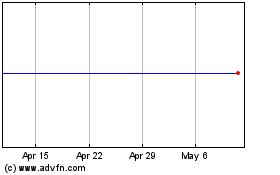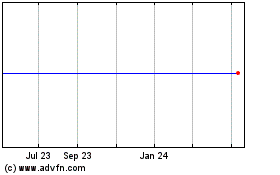Security Software Grows Increasingly Popular As M&A Target
September 13 2010 - 8:52PM
Dow Jones News
Technology companies are increasingly looking at
security-software companies as acquisition targets, hoping they can
integrate safety features they buy into their own products.
On Monday, Hewlett-Packard Co. (HPQ) was the latest tech giant
to strike a deal for a security company, offering roughly $1.5
billion to buy network security company ArcSight Inc. (ARST).
The deal follows H-P's earlier acquisition of privately-held
Fortify Software Inc. In August, Intel Corp. (INTC) said it would
buy security-software vendor McAfee Inc. (MFE) for $7.7 billion.
International Business Machines Corp. (IBM) has lately picked up a
handful of security companies, including the privately held
companies BigFix Inc. and Guardium.
The host of deals comes as technology companies seek to address
a growing number of threats that are emerging as the way people use
computers changes. More and more computing is conducted over
cloud-computing networks that let users access remote data. At the
same time, more computing is being done from mobile devices, such
as smartphones and tablet computers.
Prompted by the growing prevalence of viruses, worms and
malware, more and more technology companies are trying to build
security directly into their products rather than ask users to
layer on additional protective software. Some, like IBM, are
integrating security features into software applications, such as
human resources and accounting programs.
"People want more secure products, rather than more security
products," said Tom Corn, the chief strategy officer at RSA, the
security software division of EMC Corp. (EMC).
The desire for security is understandable.
In 2008, Symantec Corp. (SYMC) had to create 1.6 million
signatures for computer viruses, worms and Trojan horses, Enrique
Salem, president and chief executive of Symantec, told Dow Jones in
a recent interview. That was more than the previous 17 years
combined.
Since then, things have only worsened. In 2009, Symantec created
nearly double the number of signatures.
Cloud computing is also prompting the desire for more built-in
security.
One of the appeals of cloud computing is it allows applications
and data to be stored centrally but accessed remotely. That can
often reduce costs for companies employing the strategy.
It also can raise the potential harm caused by a security breach
because so much data is located in one place.
"Cloud computing centralizes sensitive data in a smaller number
of locations," said Phil Neray, a data-security vice president at
IBM. It just takes one unauthorized entry into a datacenter to
unleash extensive damage, he said.
At the same time, the rapid rise of smartphones and tablets as
alternate computing devices is pushing the appeal of
security-software companies. Apple Inc. (AAPL) iPads and Research
In Motion Ltd. (RIMM) smartphones are used by consumers and
businessmen to connect to the Internet. Point-of-sale machines,
ATM's, cars and televisions are also increasingly connected. As
those devices connect to others, the potential for them to be
hacked rises.
"All those computing devices out there are connecting to a
network," said Stifel Nicolaus analyst Aaron C. Rakers. "It's
another node that needs to be secured."
-By Jeanette Borzo, Dow Jones Newswires; 415 765 8230;
jeanette.borzo@dowjones.com
Mcafee (NYSE:MFE)
Historical Stock Chart
From Mar 2024 to Apr 2024

Mcafee (NYSE:MFE)
Historical Stock Chart
From Apr 2023 to Apr 2024
